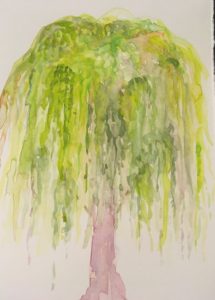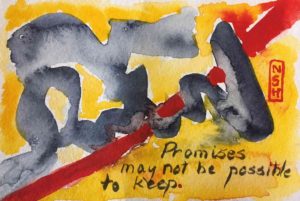 We called in hospice yesterday. Knowing he’s got a terminal disease intellectually and that hospice will be helpful, and making the decision to call in hospice are very far apart on my emotional spectrum. GGGGHHHHHAAAAA!!!
We called in hospice yesterday. Knowing he’s got a terminal disease intellectually and that hospice will be helpful, and making the decision to call in hospice are very far apart on my emotional spectrum. GGGGHHHHHAAAAA!!!
We left the hospital knowing we’d get the support of home health. Nurse, CNA to help with showers, physical therapy, speech therapy, occupational therapy. But it didn’t work.
Within a day of being home he needed oxygen again, any time he fell asleep. It appears that when asleep his brain isn’t sending the right messages to his diaphragm to breathe deeply. We had two horrific nights before we realized what was happening. By then it was Saturday. An impossible task to get oxygen at home on a Saturday for the first time. Home health said only solution was to go back to the ER and be admitted.
Everyone kept telling me to get hospice. More help. More services at home. Everyone who had hospice on the Multiple System Atrophy sites said they were glad they did. Others say they wished they’d done it earlier. It totally makes sense. So what was my problem making the call?
It felt like giving in on my part? Like a jinx? Like it would open the floodgates of grief? Would it make him give up?
Even if that all were true, what would be wrong with that, at this point, because he’s miserable breathing as he is at night.
So we called in hospice. More challenges with people who know little about neurodegenerative diseases, especially Multiple System Atrophy. Things to explain. Equipment to be delivered. Thankfully the kids were all around, sometimes sitting with us, sometimes making jokes and dinner in the other room.
I found myself completely impatient with the nurse doing the evaluation for acceptance. I wanted to be mean. She was very nice. It wasn’t her. I felt like I was sliding over the edge of a waterfall into an abyss.
But we got oxygen! Yet we still had a difficult night as the oxygen didn’t work well with his CPAP machine for his sleep apnea. At 4 AM this morning, I was holding him in my arms, crying for both of us.
Because we have hospice, another nurse came today and we got a couple of different small pieces of equipment and a morphine prescription which we don’t plan to use yet except if we can’t get him comfortable at night. It was good to have someone to bring us stuff. We can and do get better info from doctor friends and colleagues but we can’t get the equipment. Maybe tonight will be better.
It’s surreal to have what is almost a normal afternoon, some quiet time, a swim with the kids. He didn’t get in the pool today but he did yesterday. Today he just watched from his wheelchair as he read the sports page, then watched a Red Sox game on TV. This afternoon we had cocktails with friends on the porch. Ate a lovely dinner a friend brought by.
Is this really happening?
 Fear and exhaustion in the hospital go hand in hand and this is our 7th day. It’s frightening for us both that he isn’t breathing better. It’s exhausting for him to find it so hard to breathe and exhausting for me to be sitting at his side, then driving the 25 minutes back and forth, nevermind the emotional toll.
Fear and exhaustion in the hospital go hand in hand and this is our 7th day. It’s frightening for us both that he isn’t breathing better. It’s exhausting for him to find it so hard to breathe and exhausting for me to be sitting at his side, then driving the 25 minutes back and forth, nevermind the emotional toll. I just read that all caregiver coping strategies aren’t equal.
I just read that all caregiver coping strategies aren’t equal. The caretaking increases and the fun continues to decrease. I’m tired of trying to encourage him to exercise. Tired of using my energy to try to motivate him. Tired of his “I can do it,” and then he can’t.
The caretaking increases and the fun continues to decrease. I’m tired of trying to encourage him to exercise. Tired of using my energy to try to motivate him. Tired of his “I can do it,” and then he can’t. Some days I have nothing left. They sneak up, seemingly without reason.
Some days I have nothing left. They sneak up, seemingly without reason. I encountered two extremely different perspectives on being a caregiver in the last few days.
I encountered two extremely different perspectives on being a caregiver in the last few days. and how it wore him down to the point of planning suicide. He wanted a way out and he couldn’t see any other way. Luckily, with grace, he brought his wife to the hospital and got help. Unfortunately, it appeared from the article that he still felt some guilt. “I always felt that she died thinking I didn’t do what I was supposed to do.”
and how it wore him down to the point of planning suicide. He wanted a way out and he couldn’t see any other way. Luckily, with grace, he brought his wife to the hospital and got help. Unfortunately, it appeared from the article that he still felt some guilt. “I always felt that she died thinking I didn’t do what I was supposed to do.” For me this disease in our lives is like watching someone age before my eyes. He was a big strong handsome guy – think Tom Selleck (I always did). He could lift anything and never needed to ask for help. He told me once he’d never felt physically vulnerable, which was the opposite of me since I’m 5’2″ and grew up in New York City. I always felt vulnerable.
For me this disease in our lives is like watching someone age before my eyes. He was a big strong handsome guy – think Tom Selleck (I always did). He could lift anything and never needed to ask for help. He told me once he’d never felt physically vulnerable, which was the opposite of me since I’m 5’2″ and grew up in New York City. I always felt vulnerable. How easily our equilibrium tips out of balance. This time it was a hard fall.
How easily our equilibrium tips out of balance. This time it was a hard fall.